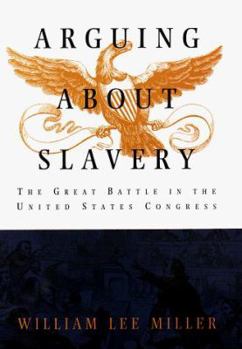Arguing about Slavery: The Great Battle in the United States Congress
Select Format
Select Condition 
Book Overview
In the 1830s slavery was so deeply entrenched that it could not even be discussed in Congress, which had enacted a "gag rule" to ensure that anti-slavery petitions would be summarily rejected. This... This description may be from another edition of this product.
Format:Hardcover
Language:English
ISBN:0394569229
ISBN13:9780394569222
Release Date:January 1996
Publisher:Alfred A. Knopf
Length:577 Pages
Weight:2.04 lbs.
Dimensions:1.8" x 6.6" x 9.6"
Customer Reviews
5 ratings
Miller should be lionized
Published by Thriftbooks.com User , 15 years ago
Miller, as all know,is a national treasure. No one I know could have made this subject breathe nearly two centuries later. I wonder if anyone else could have guessed the importance of the subject. Miller gets in the mind(s) of his (historical) characters better than anyone else. He is always a good read; deep, colorful, poignant. He is a national treasure.
A great, great book
Published by Thriftbooks.com User , 24 years ago
This book deals with events from 1835 to 1845 and is principally concerned with John Quincy Adams' fight over the House rule which forbad the reception of petitions about slavery. This may seem like a narrow issue to be the subject of a 556 page book, but this book is flawlessly written, and has great humor--exposing the idiocy of the slavery upholders--and at times brought tears to my eyes. A dropback to the stirring events of 1775 and 1776, found on pages 155 to 157, is as good a writing as I have ever seen evoking the sheer drama of those days. This is a nigh flawless book for one as interested as I am in congressional history and the years before the Civil War.
A well-written and captivating story
Published by Thriftbooks.com User , 25 years ago
Discussions of the American conflict over slavery often focus heavily on the 1850s and 1860s. Yet many fascinating events occurred in the decades before 1850, events which caused the various American positions on slavery to develop and solidify. In "Arguing About Slavery", Miller does an excellent job of telling the story of one particular set of conflicts over slavery that occurred (primarily) on the floor of the US Congress in the 1830s and 1840s. I have never almost never seen a historian bring such a diverse cast of characters to life in such a fascinating way. Miller tells the story of the ordinary men and women who were moved to sign their names on thousands and thousands of anti-slavery petitions, of the abolitionist organizers who delivered these petitions to Congress, and of the politicians who rhetorically (and later, physically) brawled over the question of whether or not to allow the issue of slavery to be discussed. At times, the chronology becomes a bit hard to follow -- Miller has a confusing habit of jumping backwards or forwards, referring to speeches or events that occurred years earlier or later -- but his narrative is dramatic and it'll keep you interested right through to the end. I really had difficulty putting this book down, and in fact I keep going back to it. I wholeheartily recommend this book!
It surpassed all expectations
Published by Thriftbooks.com User , 25 years ago
This is an excellent book, one that surpassed any expectation I might have had for it. And my expectations were high, because the critics spoke so highly of it when it was released. Still, I doubted whether a decade-long legislative battle could carry my interest for 300+ pages. I was wrong. Every page and character was interesting, and the consistent imagery of John Quincy Adams, in the sunset of his political career, battling the southern foes in Congress on a daily basis is an enduring one. Books like this one should be substituted for the dry history curriculum that I had in high school.
Wonderful chronicle of an astonishing period in Congress
Published by Thriftbooks.com User , 25 years ago
Miller presents a detailed history of a remarkable period in U.S. Congressional history leading up to the Civil War. Miller describes the battle waged in the U.S. House of Representatives, led by John Quincy Adams, to preserve the right of citizens to petition their government, and his efforts to keep the issue of slavery before the House. I finally saw one of the important effects of the infamous 3/5's rule, which was to create a power imbalance in Congress in which slave holding states dominated the House due to the additional Congressional Reps. they gained by virtue of their large slave populations. It was this imbalance that hindered Congress from a full debate regarding the abolition of slavery. Extremely informative, very well researched and documented, and Miller weaves a witty commentary throughout that is most enjoyable. This is a book that should be read in every high school American History class. It is at times dry (big surprise as Miller details Congressional proceedings) but nonetheless fascinating. I have a new appreciation of the contribution of Adams to the battle against slavery.





